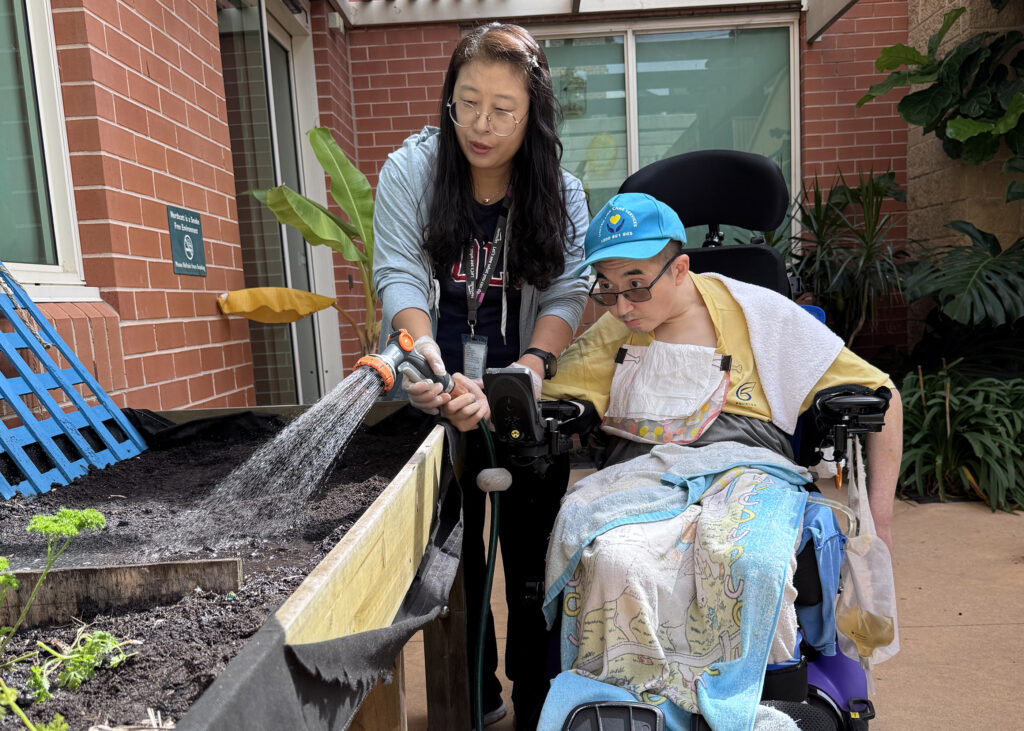
Northcott has been awarded a significant grant from the NDIS Quality and Safeguarding Commission’s ‘Support for NDIS Provider Program’.
Northcott will develop a ‘Best-in-Class’ practice framework for high intensity daily personal activities, with the objective to achieve a nationally consistent approach and strengthen the provision of support for NDIS participants with complex health needs.
Northcott’s expertise in this area has positioned us as the partner of choice to develop this framework, showing our national leadership in creating innovative practice models.
We had a conversation with Benjamin Chain, Northcott’s Clinical Practice Lead, who shares with us the details of this new model and explains why it is important for the wellbeing of all people with disability.
It sounds very important, but what exactly is the Best-in-Class: a practice framework for High Intensity Daily Personal Activities?
This is an exciting opportunity to develop a practice framework that is benchmarked against the NDIS Practice Standards and Quality Indicators. We will develop a digital resource package to set high standards of support, and education material that will enable service providers across the country to have the necessary resources when supporting NDIS participants with complex health needs.
What does high intensity daily personal activities mean?
High intensity daily personal activities represent some of highest risks for NDIS participants, workers and others. It’s an area where NDIS providers must take particular care to source the relevant skills and knowledge to deliver high quality and safe supports. These include supports such as: enteral nutrition, complex bowel care, urinary catheter care, mechanical ventilation, tracheostomy, subcutaneous injections and PRN medication post epilepsy.
How will people with disability benefit from this project?
People with disability have higher healthcare rates than the general population. As we know, many support workers do not have a formal background in healthcare.
This framework will provide the necessary standard of care to deliver high risk supports to NDIS participants in response to the new regulatory model for service providers of all sizes, scales and complexity. The framework also includes a ‘No Assumptions’ campaign to minimise treatment delays, which is important for supporting people with intellectual and communication limitations.
The ‘Best-in-Class’ framework will also extend and build on the existing hospital support resources so people with disability can achieve improved health outcomes when they come into contact with the hospital system.
What impact will this project have on the services NDIS participants receive?
The ‘Best-in-Class’ practice framework will contribute to the national information and education programs aimed at developing and growing a quality market in the NDIS. The objective of the project is in line with the NDIS Quality and Safeguarding Commission’s mission of providing national consistency in the safety and quality of services that NDIS participants receive.
It will enable all service providers, including existing and new entrants, to implement a consistent, evidence based and reliable approach in providing high risk supports for NDIS participants who require high intensity daily personal activities among other healthcare needs.
The framework will ultimately drive a healthy market that gives NDIS participants choice and control over the services they would like to purchase.
There is an ongoing debate around the responsibilities of NDIS and mainstream health. Will this project define some of those boundaries?
This project is a clear example of how we are actively looking for solutions in the NDIS market.
Many NDIS participants and service providers continue to face challenges around who is responsible for what. The project resources will help NDIS participants and service providers identify these responsibilities and ensure that funding from NDIS plans is not spent on allied health services that are potentially the responsibility of mainstream health. The practice framework is intended to help close some of the existing gaps between health and the National Disability Insurance Agency (NDIA).
How will this ‘Best-in-class’ framework come to life?
Using the principles of co-design, we will engage with NDIS participants, carers, service providers, support workers and other industry stakeholders to assist in the development of the resource material and user experience of the digital asset resource pack and e-learning modules.
We have a set of deliverables that we committed to in the grant submission:
- A digital asset resource pack and links to relevant external sites / resources where permission has been given to do so.
- A “Best-in-Class” practice framework which aligns with the NDIS Quality Indicators and Practice Standards
- Interactive e-learning modules for service providers
- Video resources showing scenarios and how to act
- Decision tools, hospital and GP/ specialist support resources
- Paramedic handover tool, hospital discharge planning tools for service providers
- Support Plan templates and Policy and Procedure Packs
- “No Assumptions” campaign and resource toolkit, targeting common risk factors, early warning signs and decision errors to assist support workers to understand, implement and improve practices that safeguard the health and wellbeing of the people they support.
- Promotion of the resources by meeting with key industry leaders, presenting at forums and other key events.
All resource material will be developed in simple Plain English format to accommodate the diverse workforce that characterises the disability industry.
Why did you decide to submit this project?
The NDIS Practice Standards and Quality Indicators set the benchmark for high quality and safe supports for NDIS participants. It makes sense to leverage off this new regulatory model and provide a practical framework that is aligned with the new industry standards.
In addition, the urgency of this initiative is reinforced by recent research which shows there are potentially avoidable deaths affecting people with disability due to systemic gaps in the service provision (NSW Ombudsman, 2018). Critical health changes are common in people with disability; early detection and timely medical advice is critical when providing supports to people with disability, particularly people with limited communication, behaviours of concern and participants who have a broad spectrum of health concerns.
What are you expecting to be the main outcome of this project?
The ‘Best-in-Class’ practice framework will be a nation-wide community tool to help all service providers meet the healthcare needs of people with a disability they support.
The Clinical Practice Health team at Northcott provides clinical support and advice for staff and customers in relation to their individualised healthcare needs. This includes education to customers and support workers, training in healthcare procedures, along with assessments, tailored support and recommendations to improve health outcomes.
The responsibilities of this team include developing and maintaining minimum practice standards (in accordance with the NDIS Practice Standards and Quality Indicators); developing healthcare policies and procedures based on evidence, customer needs, context and resources; identifying and responding to risk; and undertaking continuous improvement initiatives.



Accessibility and Inclusivity
We respect and honour Aboriginal and Torres Strait Islander Elders past, present and future. We acknowledge the stories, traditions and living cultures of Aboriginal and Torres Strait Islander peoples on this land and commit to building a brighter future together.
Read more about our commitment to reconciliation

